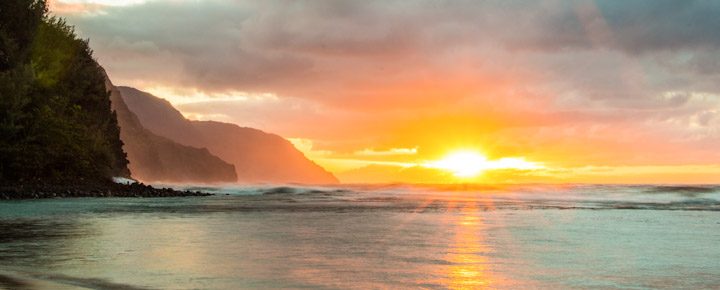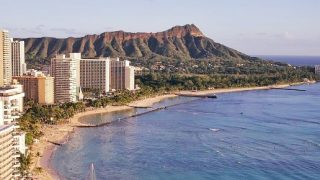Politics can change as quickly as Hawaii’s weather in a tropical storm. And so it is no great surprise that newly elected Governor Green has changed his mind again on statewide Hawaii visitor “Green” fees.
Previously the governor appeared set on an across-the-board $50 fee to be charged to visitors via airlines or accommodations. That was both unworkable and in all likelihood, unconstitutional, as you’ve pointed out in comments innumerable times. But now his team has devised a plan that may be at least somewhat more palatable but leaving us with questions still to be addressed. Why is it more palatable? Because it gives visitors an option to buy a passport or not.
In the past few days, the governor’s office has introduced bills announcing the fee-based annual passport-style pass. For the first time ever, he is now looking to only charge those who plan to go to the following state-owned locations:
- State Parks
- State Beaches (county beaches like Waikiki are not included)
- State Forests (think Kokee on Kauai)
- Trails in State Parks
- Other state recreational natural areas.
The original intent was for the visitor fee to be applied to everyone. Now it will only be for those who choose to enjoy state-owned areas. For example, on Kauai, most all beaches are exempt (because they are county beaches) except for Polihale and Hanea/Kee. Here’s the issue. Polihale requires driving on a bumpy 5-mile sugar cane dirt road that most rental car companies don’t allow their vehicles to be on. And Haena and Kee have multiple complications. These already require advance reservations that sell out 30 days in advance, while there’s a daily limit on how many people can use the beach.
So, it would be easy for visitors to bypass these two beaches since they are not easily accessible anyway, enjoy the county beaches and say no to a visitor passport. Keep in mind, however, that Hawaii’s counties are in the process of levying their own fees (see below).
But what about Kokee and Waimea Canyon parks? They currently have a daily visitor fee of $5 per person and a $10 vehicle charge. That is still a better buy than a $50 per person annual passport fee. What has not been discussed is if that daily fee will be replaced by the annual passport.
“Green fees” on arrival are illegal.
It took a long time for it to sink in, and your comments addressed it far sooner than he did.
You’re not allowed to collect these fees directly at airports. — Governor Green.
So now the plan has turned to become an annual “environmental license,” which will be mandatory for those visiting any of these state-owned areas.
Hawaii tourism stakeholders chime in.
There’s already been much comment about the change in plans, such as from Hawaii Lodging Association’s Mufi Hannemann, who said, “I’m very pleased that he’s moved off a blanket green fee.” Buy-in from Hawaii visitor industry stakeholders is considered essential to the success of such a plan. He added, “This is a benefit, not just for visitors,” but residents will also see that they’ll be able to benefit from these areas.”
We’re waiting to be convinced that the money will actually make its way to restoring natural resources.
Where will the money collected go?
The fees collected from the annual passport are to be used for the mitigation of Hawaii tourism’s impact as well as for contending with bigger issues, including coral bleaching, sea-level rise and coastal erosion, reef repairs, and invasive species. Hannemann said that green fees should be earmarked towards special funds for the maintenance and preservation of those places and not end up in the state’s general fund. “We just don’t like when it sneaks into the general fund and gets used for other purposes.”
How will an annual passport be enforced?
That’s a good one. So many of the places it would be required don’t have any means of enforcement.
State Senate President Ron Kouchi said, “If we are not able to get that compliance then we are going to have a lot of people… who are simply not going to get the license and are going to go to those recreational areas and how will we know that they paid?”
We agree with you, Ron. And how much will enforcement cost by hiring people at each location?
But also, how practical is this plan?
Annual visitor passport is pending legislative action.
That means you can still comment on this, as nothing has been decided on for sure. Here’s some of the legislation under consideration.
There are multiple bills before the legislature, most of which are largely duplicitous. These will require that visitors 15-16 years of age or older (varies by bill) have an annual permit to use the state’s resources listed above.
Any plan that gets us to a place where resources come from the impact of [Hawaii] travelers to protect our environment. — Gov. Green.
Green appears ready to accept whatever plan can get through the state legislature. Also being called for in some bills is the concept of an oversight commission to ensure that money gets to the right places. That could also provide grants associated with environmental protection in Hawaii.
Bills call for deferment, fines, and mobile apps.
Some of the bills indicate a five-year moratorium before enforcement begins. Fines and penalties are not yet indicated. It seems all but certain that their will be apps associated with the passports, perhaps for purchasing and maybe even for helping visitors who use these resources.
If you want to learn more and comment, you can look up Hawaii bills here. Those pending include HB1051, HB1162, HB1237, SB304, SB 636, SB658, SB1349.
Counties can levy their own “green fees.”
Nothing in the pending legislation precludes counties from charging visitors for the use of their own facilities. Those would include county beaches, parks, and other recreation areas. For example, Maui plans to charge visitors $30 for parking at its beach parks starting this year. It has already limited visitor parking to certain hours. Kauai has indicated a similar predilection to visitor fees.







This is not the aloha spirit..I love Maui but now tuning into nothing but a money trap same kaui ….what happened to your traditions and values ..this the politicians the money won’t help the real people or communities same like politicians reason lahiana burned seriously
I own a condo here and just paid 1/2 my property tax, which has gone up 100% in the last 4 years and I will have to pay for this parking Fee. I own two cars here, pay inspection and registration too. I have a Hawaii resident ID! Why do I need to pay more?
If you have a Hawaiian driver’s license, I don’t think you have to pay more than any other resident except if you have a property in Maui (condo in your case) that you are not using or renting out to long term residents. Basically, this was done to avoid having all these properties empty for months while locals had no place to live. I personally think that’s fair. To avoid higher property taxes, you need to pay your income taxes in Hawaii.
Can Anyone Guarantee where the Money will go? The State is Notorious for diverting money everywhere else including Losing Track of Large Amounts, at the County Level they will suddenly create new positions, which duplicate current ones, and also creatively duplicate services that they already provide to eat up fee income. Then just like the State, the County will lose track of money into the dark abysmal pit that leads to never never land, never to be accounted for again! I wonder how much will suddenly be ate up by new “Administration Costs” at Each Level of so-called “Leadership.” Good Luck getting more than nickels and dimes towards any good cause, very sad.